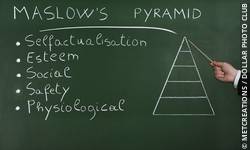Each day, we make countless choices and decisions. We will consider some choices, such as when house-hunting, for weeks or even months. But the majority of decisions we make, such as which clothes to wear this morning or what to eat for lunch, are made routinely without substantial conscious consideration on our part.
Problem Solving
An abundance of choice in our everyday lives is regarded as a luxury of modern living.
Fashion choices are an expression of our personality and even a person's preferences for particular brands when shopping may be considered as extensions of their persona.
The option to choose is something that we no longer just value but now expect - it is a prerequisite to all democratic institutions that people are given the option to choose between two or more candidates or ideas.
Yet, even when we are presented with a false choice (for example, when two candidates in an election offer practically identical policies) we still expect the ritual of making a decision. We demand and often take for granted the ability to make choices in our day-to-day lives, and free market competition feeds into that expectation by give consumers a degree of product choice whilst shopping.
Contrary to the demand for choice, however, psychologists have found that excessive choices can actually have a negative effect on us.
In this article, we take a look at the influences on decision making that most of us are unaware are even impacting us, and why we may not always be able to trust even the decisions that we thought we were making ourselves.
What unconscious influences affect the choices I make?
Unless you were being overtly coerced into making a forced decision, you will generally assume that you have the free will to make the choices in life that will provide the best outcome for you. However, underlying every decision we make are numerous influences affecting our choices.
Some of these influences we will not be conscious of constantly but will be able to point to them when asked our reasoning. For example, when eating dinner, you are fulfilling one of your instinctive needs to survive - eating.
Other influences (such as the presentation of choices, which we will look at in a moment) bypass our awareness and even after making a choice we will not recognise that they have manipulated our reasoning and affected the outcome of our decision.
First, let's take a look at the needs that influence our choices but that we are aware of.
How instinctive needs affect our choices
In 1943, U.S. psychologist Abraham Maslow proposed a Hierarchy of Needs - a set of innate needs organised in a pyramid, which every person aspires to fulfill. Each of these needs affects our behavior as we yearn to satisfy them.1
The most basic of that set of needs are our deficiency needs - essential physiological requisites for survival, such as nourishment, warmth and water. Whilst these survival instincts are no longer key to many of our decisions, they still influence our daily routine by way of mealtimes.
More significant are the growth or 'self-actualization' needs - desires for personal fulfillment which identified at the top of his needs hierarchy. Once our survival needs are met, we try to form relationships and undertake activities which will boost our self image.
These needs affect many of the choices we make when, for example, socializing, helping to determine the relationship choices we make with a view to increasing our self esteem.
Like Maslow, psychiatrist William Glasser distinguished between survival and psychological needs in his 1996 book Choice Theory.
Glasser (1996) postulated that unhappiness results from bad relationships with relatives and friends, which in turn suffer as a result of making misguided choices. He believed that by making better choices, we can maintain better relationships which will help us to lead a more fulfilled lives - reasoning which forms the basis of Glasser's Reality Therapy, which he had developed in the 1960s.2
Was Glasser's attribution of unhappiness to bad choices accurate?
Choice Theory seems to identify the root of all unhappiness - even mental disorders - as being self-determined decision making. As a result, his theories have been criticized as over-simplifying complex psychological issues, especially when psychologist have identified other factors that can influence mental health.
For example, psychologists have found that our genes and relationships in early life can pre-dispose us to some mental disorders.
Do we decide based on Marginal Utility?
Marginal utility is a theory which originates from the field of economics. It suggests that every decision we make is based on the getting the greatest potential benefit, known as marginal utility, from the choice (the optimal decision) that we make. Let's take an example:
At a fair, you pay to play a game where you are presented with 3 cups. Under each cup there is either nothing or a prize. You are given the potential prize and chances of the prize:
- The 1st cup has a 50% chance of containing 2 coins
- The 2nd cup has a 25% chance of containing 2 coins
- The 3rd cup has a 20% chance of containing 2 coins
Which cup should you choose?
According to the theory, you will choose the first cup as it offers the highest potential reward. Philosopher Blaise Pascal employed marginal utility in reasoning known as Pascal's Wager3 - a calculation of whether or not to believe in God.
Pascal believed that the greatest marginal utility could be gained from believing. Doubters, he reasoned, should attempt to believe as this would gain God's favor, but there was no similar reward for not believing.
Of course, we are not always so rational as to make every decision based on a calculation of its reward. Let's take a look at some other influences over our choices.
Impact of choice presentation
Aside from cool-headed reasoning, how else do we make choices?
Ad men seek to manipulate the choices we make as consumers via the plethora of adverts that we see daily. But without explicit persuasion, how can they influence people without them even realising?
One method of manipulation is through the phrasing of questions, known as framing. This is particularly important in the development of questions presented to an electorate in a referendum.
The subtle phrasing of a closed question in a referendum has been found to affect people's choices.4
For example, an aversion to risk can lead people to Status Quo Bias - favouring a maintenance of the current situation even when the alternative could offer a greater marginal utility.
Samuelson and Zeckhauser (1988) demonstrated this with a study in which participants completed a questionnaire. Some question options were altered to be framed as maintaining the status quo. Where this occurred, participants were more likely to choose the option which maintained continuity, rather than risking change.5
The Status Quo Bias has also been noted in real world situations. Kempf and Ruenzi (2006) found that, when people were offered the opportunity to keep their financial plan or to change to a different plan, they were more likely to keep their existing plan even if an alternative offered a better reward.6
We can understand the Status Quo Bias in terms of loss aversion - people feel that they have more to lose than they have to gain by change.
Gächter (2009) identified this loss aversion in a group of PhD students who, when warned of a penalty fee for late enrolment to classes, were more likely to enrol than another group, who were incentivised with a reward for early enrolment.7
So if people tend to make conservative choices, can they be persuaded to choose options which will change their lives for the better?
'Nudging' towards better choices
This question is explored in the book Nudge (Thaler & Sunstein, 2008). Thaler and Sunstein developed the theory of Choice Architecture and more specifically, Nudge Theory.8
Nudge Theory postulates that people can be subtly 'nudged' towards making better choices and gained such traction with the UK government that it created a Behavioural Insights Team to look at how such a theory could be employed in the real world.
The team claims that 96,000 organ donors could be added to the donor's register by framing the opt-in question in a way that would draw on people's reciprocal altruism.9
Elsewhere, Nudge Theory has been employed at Amsterdam's Schipol airport, with adding a picture of a fly to the urinals in the men's toilets in order to improve their users' aim.
Social influences on decision making
Numerous other factors, or biases, can affect the choices we make without us even realizing their effect on us.
Social influences can lead us towards a herd mentality - making the same choice as our peers in order to 'fit into' a group. Solomon Asch identified this most acutely in a series of well-known conformity experiments, in which participants were asked to judge the length of a set of sticks.
Conspirators were asked to identify some identical sticks as being inches different in length to others. The genuine test subjects then copied this judgement when the sticks were obviously similar.10
Equally of note is the effect of social roles on the choices we make. Philip Zimbardo conducted the now infamous Stanford Prison Experiment (1971) in which participants were asked to take on the role of prison guards.
In doing so, they adopted the attitudes and choices that they perceived prison guards to have, and became increasingly sadistic towards participants playing the role of prisoners.11
Making better choices
The issue of how we make choices and decisions is far from a new one. The concept of free will - the ability to decide freely - is an important topic for theologians, who view it as key to being able to distinguish between 'good' and 'evil' - demonstrated literally in Adam and Eve's choice making in the Garden of Eden. This reinforces the idea that our ability to make choices defines us as individuals.
Yet, as we have learnt from numerous psychological studies, our choices may be free but they are not free from influence.
Many factors manipulate and restrain our decision making, whether intentionally or passively. Choice theory remains an active topic of research across numerous fields, with, for example, lawyer Kent Greenfield exploring the question of choice in depth in his 2011 book The Myth of Choice12.
How do we make better choices? It is almost impossible to claim to be free from influence of some type, but the least we can do is become more aware of those influences and understand how they affect our decision making without us being conscious of it.




























